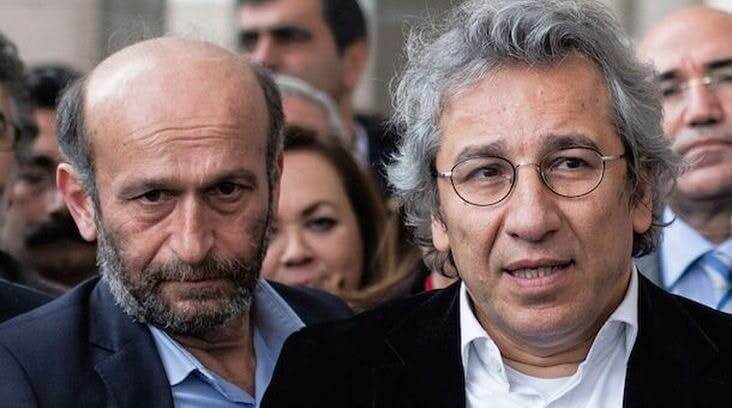On November 26, Dündar, the editor-in-chief of the newspaper Cumhuriyet, and Gül, the Ankara bureau chief, were arrested based on a criminal complaint filed against them by President Recep Tayyip Erdogan. The complaint stems from a report published in Cumhuriyet on May 29, 2015 with photos and video footage claiming that Turkey's National Intelligence Organization secretly armed Islamist rebel groups in Syria. The two journalists are being held at the high-security Silivri prison west of Istanbul. They are currently awaiting trial and facing up to life in prison.
“The rise of authoritarianism in Turkey is blatant. Erdogan’s government crackdown on independent journalists is a step towards exerting dictatorial control over Turkey’s media,” said HRF president Thor Halvorssen. “Dündar and Gül are at serious risk of spending their lives in jail simply because they reported on a matter of public interest and scrutinized the government’s actions. Journalists everywhere should be free to work without fear of criminal prosecution. Erdogan must order the release of these two journalists and drop the charges against them immediately,” added Halvorssen.
On January 27, the Istanbul deputy chief public prosecutor indicted Dündar and Gül, seeking a life sentence, an aggravated life sentence, and 30 years of imprisonment for both journalists. The charges include “gathering secret state documents for the purposes of political and military espionage” under Article 330 of the Turkish Penal Code and “seeking to overthrow the Turkish government” under Article 310 of the code. The two were also charged with “deliberate support for a terrorist organization” under Article 7 of the Anti-Terror Law.
Dündar and Gül each spent 40 days in solitary confinement before they were transferred to the same cell. The two were barred from most visitations. On January 8, a coalition of 11 international human rights organizations and activists submitted a visitation request to the Ministry of Justice. After the request was denied, delegates from the coalition traveled to Turkey to demonstrate outside of Silivri prison to condemn the denial and call for their release.
Over the last few years, both local and foreign media in Turkey have been operating in an extremely hostile environment. Last October, a few weeks before the parliamentary elections, Erdogan’s government took over the management of Koza Ipek Holding, a conglomerate known for its opposition to the government, and seized control over its television channels and newspapers. In 2014, Turkey amended its internet law to increase government surveillance powers, encourage self-censorship, and increase penalties against journalists. The new law enables the government to request and collect data on all internet users and to block content without judicial review. A large number of journalists are on trial or behind bars and foreign journalists are being deported for criticizing the president. A subservient judiciary is relying heavily on insult laws and the Anti-Terror Law to silence even the slightest criticism against the president or the government.
“Journalists should not have to operate in the shadow of overly broad and vague criminal laws. The trumped-up charges against prominent journalists, like Dündar and Gül, are of the sort routinely used by authoritarian regimes as intimidation tactics to silence criticism and encourage self-censorship,” said Javier El-Hage, chief legal officer of HRF. “The abuse of such laws to penalize the exercise of freedom of expression is a clear violation of Article 10 of the European Convention on Human Rights (ECHR) and Article 19 of the International Covenant on Civil and Political Rights, treaties that are binding upon Turkey,” El-Hage added.
The Human Rights Foundation (HRF) is a nonpartisan nonprofit organization that promotes and protects human rights globally, with a focus on closed societies. HRF’s International Council includes human rights advocates George Ayittey, Vladimir Bukovsky, Palden Gyatso, Garry Kasparov, Mutabar Tadjibaeva, Ramón J. Velásquez, Elie Wiesel, and Harry Wu.
Contact: Noemi Gonzalo-Bilbao, (212) 246-8486, noemi@humanrightsfdn.wpengine.com
